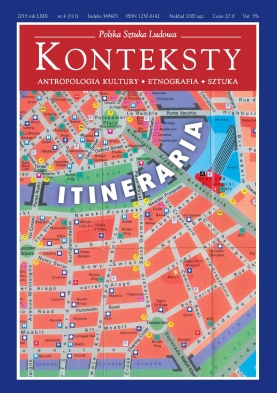Pierwsze pokolenie polskich freudystów – próba geopsychoanalizy
The First Generation of Polish Freudians – an Attempt at Geopsychoanalysis
Author(s): Lena MagnoneSubject(s): History, Social Sciences, Psychology, Geography, Regional studies, Sociology
Published by: Instytut Sztuki Polskiej Akademii Nauk
Keywords: psychoanalysis; history; Freud
Summary/Abstract: Doctor Krokowski from The Magic Mountain by Thomas Mann as well as other examples from inter-war European literature demonstrate that the psychoanalyst in the group consciousness of the period was a Polish Jew. The distinct connection between psychoanalysis and Polishness was the outcome of a considerable representation of persons of Polish origin among the pioneers of the movement: Poles were among the closest collaborators of Freud and in the Vienna Psychoanalytic Society they comprised the second largest group after the Austrians. They also included numerous courageous women who frequently combined psychoanalytical practice with radical socialism and decidedly feminist views. The author of the article outlined a sui generis group biography of this generation of cosmopolitan intellectuals, lay Jews born in Galicia, Poles educated and working in Vienna or Berlin, believing in the cultural and political force of the Freudian project and dramatically aware of the need to change the world or at the very least its sexual and social codes. In this fashion the author showed the way in which the outbreak of the Second Word War affected the fate of the protagonists of the text, condemning them, at the height of their careers, to emigration and starting life anew in entirely different conditions; he also proved that the year 1939 denoted the end of the emancipatory dimension of classical psychoanalysis, which from a Central European cultural project turned into an American theory. The personal successes of the Europeans in their new homeland and the ostensible triumph of psychoanalysis in America conceal its actual end: psychoanalysis assumed medical dimensions and became deprived of feminist and radical features. The resignation by the emigrants of the core of Freudism – a condition for finding employment in the United States – also obliterated its Central European roots. The presented attempt at geo-psychoanalysis entails predominantly following the trajectory of the Polish members of this movement, who at the onset of the twentieth century arrived from the provinces of the Empire to its Viennese capital, and who as a result of World War II once again found themselves on the sidelines, in a psychoanalytical “Wild West”, which in the course of the following decades turned, with their cooperation, into a new centre of the world, thus relegating the former one to the role of a periphery.
Journal: Konteksty
- Issue Year: 311/2015
- Issue No: 4
- Page Range: 219-233
- Page Count: 15
- Language: Polish
- Content File-PDF

